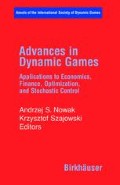Abstract
We consider stopping games for Markov chains in the formulation introduced by Dynkin [6]. Two players observe a Markov sequence and may stop it at any stage. When the chain is stopped the game terminates and Player 1 receives from Player 2 a sum depending on the player who stopped the chain and on its current state. If the game continues infinitely, then Player 1 gets “the payoff at infinity” depending on the “limiting” behavior of the chain trajectory.
We describe the structure of solutions for a class of stopping games with a countable state space and nonnegative payoffs. The payoff is equal to zero if Player 1 stops the chain but not Player 2. These solutions require using of randomized stopping rules. We study an extent of dependence of the value for these games on the “the payoff at infinity”. It turns out that this extent is determined with the “limiting” behavior of payoffs and with the transition structure of the chain.
This study was supported by grant 01-06-80279 of the Russian Foundation of Basic Research which is gratefully acknowledged.
Access this chapter
Tax calculation will be finalised at checkout
Purchases are for personal use only
Preview
Unable to display preview. Download preview PDF.
References
Alario-Lazaret M., Lepeltier J. P., Marshal B., Dynkin Games,-Stochastic Differential Systems (Bad Honnef), 23–32, (1982), Lecture Notes in Control and Information Sciences, 43, Springer-Verlag.
Bismuth J. M., Sur un problem de Dynkin, Z.Warsch. V. Geb., 39 (1977), 31–53.
Domansky V., On some game problems of optimal stopping for a sequence of sums of random variables. In: Modern Directions in Game Theory. (1976), Vilnius: Mokslas, 86–93.
Domansky V., Game problems of optimal stopping for Markov chains. Survey of seminars on probab. theory and math. statistics, LOMI Academy of Sciences URSS, (1977). Probability Theory and its Appl., v. 23, i.4 (1978), 863–865.
Domansky V, Randomized optimal stopping rules for a class of stopping games, Probability Theory and its Appl., v. 46, i.4 (2001).
Dynkin E., A game variant of optimal stopping problem, Dokl. Acad. Nauk, v. 185, N1 (1969), 16–19.
Elbakidze N., Constructing value and optimal policies for game stopping problem for Markov process, Probability Theory and its Appl., v. 21, i.1 (1976), 164–169.
Irle A., Games of stopping with infinite horizon, ZOR-Mathematical Methods of Operations Research, v. 42 (1995), 345–359.
Lepeltier J. P., Maingueneau M. A., Le jeu de Dynkin en theorie generale sans l’hypothese de Mokobodski, Stochastics, 13 (1984), 25–44.
Mazalov V., Kochetov E., Games with optimal stopping of random walks, Probability Theory and its Appl., v. 42, i.4 (1997), 820–826.
Neveu J., Discrete-Parameter Martingales, North-Holland, Amsterdam, (1975).
Presman E., Sonin I., Game problems of optimal stopping, Existence and uniqueness of equilibrium points. In: V. Arkin, ed. Probabilistic Problems for Economics Control, (1977), Moscow: Nauka, 115–144.
Rosenberg D., Solan E., and Vieille N. Stopping games with randomized strategies. Probab. Theor. Relat. Fields., vol. 119, (2001) 433–451.
Sakaguchi M., Sequential deception games. Math. Japonica, v. 37, N5 (1992) 813–826.
Shirjaev A., Statistical Sequential Analysis. Moscow, Nauka, (1976).
Stettner L., On general zero-sum stochastic games with optimal stopping, Probab. and Math. Stat., v. 3 (1982), 103–112.
Szajowski K., Optimal stopping of a discrete Markov process by two decision makers. SIAM J. Control and Optimization, v. 33, No 5 (1995), 1392–1410.
Yasuda M., On a randomized strategy in Neveu’s stopping problem, Stochastic Processes Appl., 21 (1985), 159–166.
Yasuda M., Explicit optimal value for Dynkin’s stopping game, Math. Comput. Modelling, v. 22, No 10–12 (1995), 313–324.
Author information
Authors and Affiliations
Editor information
Editors and Affiliations
Rights and permissions
Copyright information
© 2005 Birkhäuser Boston
About this chapter
Cite this chapter
Domansky, V. (2005). Dynkin’s Games with Randomized Optimal Stopping Rules. In: Nowak, A.S., Szajowski, K. (eds) Advances in Dynamic Games. Annals of the International Society of Dynamic Games, vol 7. Birkhäuser Boston. https://doi.org/10.1007/0-8176-4429-6_14
Download citation
DOI: https://doi.org/10.1007/0-8176-4429-6_14
Publisher Name: Birkhäuser Boston
Print ISBN: 978-0-8176-4362-1
Online ISBN: 978-0-8176-4429-1
eBook Packages: Mathematics and StatisticsMathematics and Statistics (R0)

